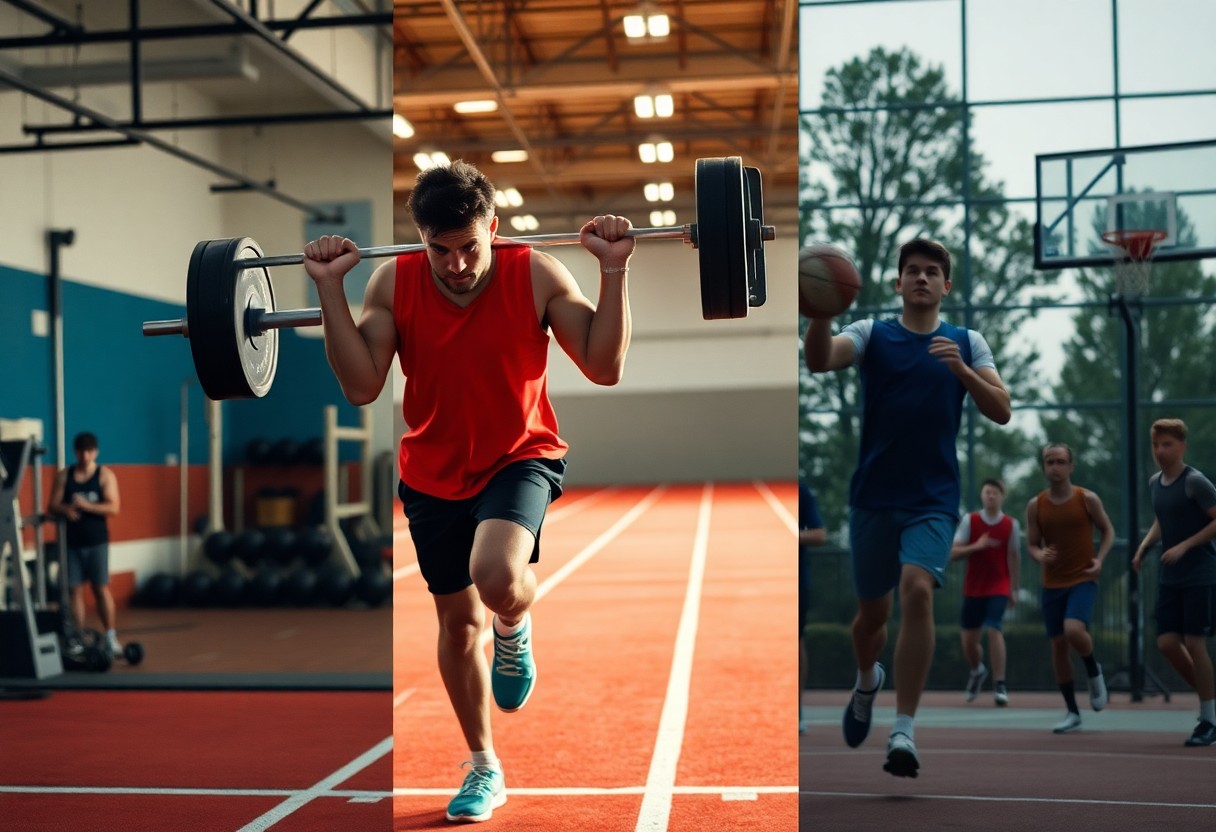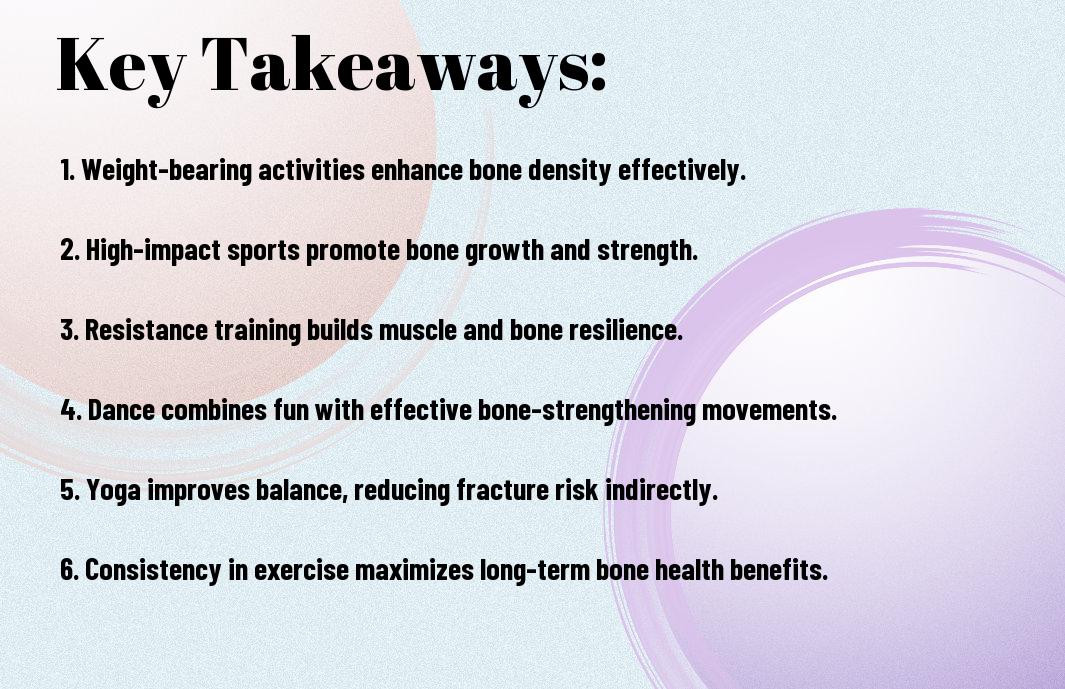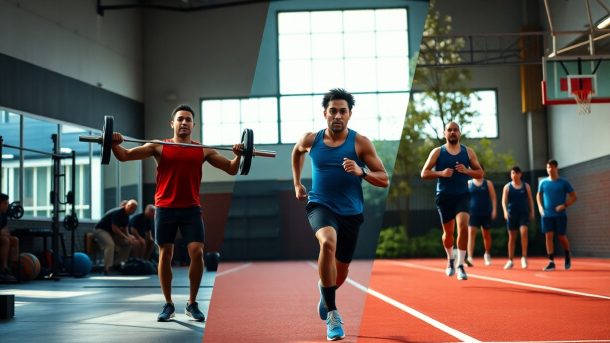Just engaging in the right sports can significantly enhance your bone strength and overall health. In this guide, you will discover the best sports to participate in for building robust bones, helping to prevent issues like osteoporosis later in life. You’ll learn how activities such as weight-bearing exercises and impact sports contribute to bone density and strength. For more insights, check out The 4 Best Sports for Strong Bones – foodspring.

Key Takeaways:
- Weight-Bearing Activities: Engaging in weight-bearing exercises like running, walking, or dancing helps stimulate bone growth and density.
- High-Impact Sports: Sports such as basketball and soccer involve jumping and quick directional changes, which can enhance bone strength.
- Resistance Training: Incorporating resistance exercises, like lifting weights, promotes muscle strength and bone health.
- Low-Impact Options: Activities like swimming and cycling are beneficial for overall fitness, though they may not provide the same bone-strengthening benefits.
- Consistency is Key: Regular physical activity is vital for maintaining healthy bones over time, regardless of the sport chosen.

Understanding Bone Health
The health of your bones is vital to your overall well-being. Strong bones not only support your body structure but also play a key role in protecting vital organs. To maintain optimal bone health, it is vital to engage in regular physical activity and consume a balanced diet rich in calcium and vitamin D. Understanding the factors that contribute to bone density and strength can help you make informed choices that enhance your skeletal health.
Importance of Bone Density
Below are some key reasons why maintaining bone density is vital for your health:
- Prevents fractures and injuries
- Supports mobility and balance
- Maintains overall skeletal strength
Factors Affecting Bone Strength
The strength of your bones is influenced by various factors, including nutritional intake, physical activity, and hormonal balance. Here are several important elements to consider:
- Diet rich in calcium and vitamin D
- Consistent weight-bearing exercises
- Genetic predisposition to bone density
- Lifestyle choices like smoking and alcohol consumption
Assume that your lifestyle choices significantly impact your bone health. For example, lack of exercise can lead to weaker bones, while a balanced diet rich in vitamins and minerals can foster bone strength. Additionally, age and hormonal changes can affect bone density, particularly in women after menopause.
Even minor adjustments to your routine can enhance your bone strength. Consider incorporating the following actions into your daily life:
- Engage in weight-bearing activities regularly
- Ensure adequate calcium and vitamin D intake
- Limit caffeine and sodium in your diet
- Consider bone health screenings as you age
Assume that proactive measures will significantly contribute to maintaining your bone strength and overall health.
Weight-Bearing Exercises
If you want to strengthen your bones, incorporating weight-bearing exercises into your routine is necessary. These activities help stimulate bone formation and improve bone density by promoting mechanical loading on your skeleton, making them a key component of bone health for individuals of all ages.
Definition and Examples
On a fundamental level, weight-bearing exercises are physical activities performed while standing, where your bones and muscles work against gravity. Examples include walking, running, dancing, hiking, and resistance training, all of which effectively engage your skeletal system and promote bone strength.
Benefits for Bone Health
On top of enhancing bone density, weight-bearing exercises can also improve balance and coordination, reducing the risk of falls. Stronger bones decrease the likelihood of fractures and osteoporosis, leading to a healthier, more active lifestyle.
Plus, engaging in regular weight-bearing exercises not only fortifies your bones but also enhances your overall fitness. These exercises stimulate your body’s natural processes, helping to prevent age-related bone loss and keeping you physically active. By committing to a consistent weight-bearing routine, you lay the foundation for healthier bones, contributing positively to your long-term well-being and mobility.
High-Impact Sports
Not all exercise routines are created equal when it comes to bone health. High-impact sports, such as basketball, soccer, and gymnastics, are particularly effective in stimulating bone density and enhancing overall strength. The repeated force applied to your bones during these activities encourages them to adapt and strengthen, ultimately reducing the risk of osteoporosis as you age.
Best Practices and Recommendations
On engaging in high-impact sports, it’s crucial to start gradually if you’re new to them. Incorporate exercises that focus on strengthening your core and lower body while ensuring proper form to minimize the risk of injury. Additionally, consider a balanced training program that mixes these activities with low-impact exercises like swimming or cycling for overall fitness.
Risks and Considerations
Along with the various benefits, high-impact sports also come with potential risks that individuals should not overlook. The intensity of these activities can lead to injuries such as stress fractures or joint issues if appropriate precautions aren’t taken. Adapting your approach based on your fitness level is important to safeguard your body.
Hence, being aware of these risks is key when participating in high-impact sports. Ensure you are equipped with the right gear, like supportive footwear, to minimize injury risks. Listening to your body is also vital; should you experience pain, it’s wise to stop and consult with healthcare professionals. Moreover, maintaining a balanced diet rich in calcium and vitamin D will further support your bone health, enabling you to enjoy the full benefits of high-impact activities while keeping potential dangers at bay.
Resistance Training
Once again, incorporating resistance training into your fitness routine is necessary for strengthening your bones. This form of exercise uses weights or resistance bands to create tension on your muscles, which in turn promotes bone density. Engaging in regular resistance training, such as lifting weights or performing bodyweight exercises, stimulates bone growth and helps maintain overall skeletal health. Aim to include resistance training sessions at least two to three times a week for optimal results.
Strength Training for Bones
Training strengthens your bones by applying stress that encourages bone adaptation. With proper technique, exercises such as squats, deadlifts, and lunges can significantly enhance bone density. It’s recommended to focus on progressively increasing weights over time while ensuring that your form remains correct to prevent injuries. Balance strength training with flexibility and cardiovascular activities for a well-rounded fitness program.
Effective Techniques
Any effective techniques for resistance training should focus on compound movements that engage multiple muscle groups. Exercises like bench presses, rows, and leg presses not only build muscle but also apply beneficial stress to your bones. Moreover, incorporating free weights or machines can help you target specific areas. Consistency and gradual progression in weights are key for effective bone strengthening.
Techniques such as using a mix of free weights, resistance machines, and bodyweight exercises will ensure that you maximize your bone health benefits. Focus on performing 8 to 12 repetitions for each exercise, allowing your muscles to feel fatigued by the end of the set. Additionally, varying your routine by integrating different movements will challenge your body in new ways, promoting further bone growth and health over time.
Lifestyle Factors
Now, to build stronger bones, your lifestyle choices play an vital role. Engage in regular weight-bearing exercises and consider these lifestyle factors:
- Avoid smoking, which can weaken bone density.
- Limit alcohol intake as excessive consumption can hinder bone health.
- Maintain a healthy weight to reduce strain on your bones.
- Prioritize sleep, as it is vital for overall health.
Assume that these factors significantly contribute to your skeletal strength, and for more insights, explore Exercise and Bone Health – OrthoInfo – AAOS.
Nutrition for Strong Bones
Any balanced diet is integral for strong bones, emphasizing calcium and vitamin D. Ensure your meals include dairy products, leafy greens, and fish, which provide these vital nutrients and support bone density.
The Role of Sunlight and Vitamin D
Factors affecting your bone health include exposure to sunlight, which is a primary source of vitamin D. Your body requires this vitamin to absorb calcium effectively, making sunlight exposure important for maintaining strong bone structure.
Indeed, without adequate vitamin D, your bones can become brittle and more susceptible to fractures. Aim for 15 to 30 minutes of sun exposure several times a week, and consider supplements if you live in areas with limited sunlight. This natural interaction with sunlight ensures your body effectively utilizes calcium, bolstering your bone health. Make conscious efforts to integrate safe sun exposure into your routine for long-term benefits.
Age and Bone Health
Your bone health significantly changes as you age, making it vital to understand how age affects bone density and strength. Throughout your life, your body constantly undergoes processes of bone formation and resorption. However, after reaching your peak bone mass in your 20s, bone density gradually declines, particularly during menopause for women and later in life for both genders, leading to a higher risk of fractures and osteoporosis.
Impact of Aging on Bones
With aging, the balance between bone resorption and formation shifts, resulting in an overall decrease in bone density. Hormonal changes, particularly in women during menopause, as well as a more sedentary lifestyle, contribute to this decline. As your bones become less dense, they may become more fragile, increasing the risk of injury from falls and other accidents.
Recommended Activities for Different Age Groups
About engaging in age-appropriate activities can help maintain and improve bone health. For children and adolescents, activities like jumping, running, and playing sports are ideal for building peak bone mass. Young adults benefit from strength training and weight-bearing exercises, while older adults should focus on balance and stability exercises along with moderate resistance training to preserve bone density and reduce the risk of falls.
For instance, children can enjoy sports such as basketball, soccer, and gymnastics, which promote bone strengthening through impact. Young adults should incorporate resistance exercises like weightlifting or bodyweight routines to stimulate bone formation. Older adults may find activities like Tai Chi or water aerobics beneficial, as they improve balance and strength without excessive strain on the joints. Engaging in these activities throughout your life can significantly contribute to stronger bones at every age.
Conclusion
Conclusively, incorporating weight-bearing and resistance exercises into your routine is necessary for building stronger bones. Activities such as running, dancing, and weightlifting can significantly enhance your bone density and overall health. By prioritizing these exercises and staying active, you are taking important steps toward maintaining robust bones throughout your life. For more insights, check out The best exercises for your bones – Harvard Health.
Q: What types of sports are most effective for building stronger bones?
A: High-impact sports are particularly effective for promoting bone health. Activities such as running, basketball, and soccer involve weight-bearing movements that help stimulate bone density. Additionally, sports that incorporate resistance training, like weightlifting or gymnastics, can increase bone strength by enhancing muscle mass, which provides additional support to the skeletal system.
Q: How often should one participate in these sports to see benefits for bone health?
A: Engaging in weight-bearing sports and activities at least 3 to 4 times a week is beneficial for bone health. Each session should ideally last a minimum of 30 minutes to ensure a sufficient stimulus for strengthening bones. It’s also effective to incorporate both high-impact exercises and resistance training to maximize bone density benefits.
Q: Are there any other exercises to complement sports for better bone strength?
A: Yes, in addition to participating in sports, it is advisable to include activities that promote balance and flexibility, such as yoga or tai chi. These exercises can help prevent falls, which is important for maintaining bone health. Moreover, incorporating stretching and core strengthening workouts will support overall stability and reduce the risk of injuries during sports activities.



